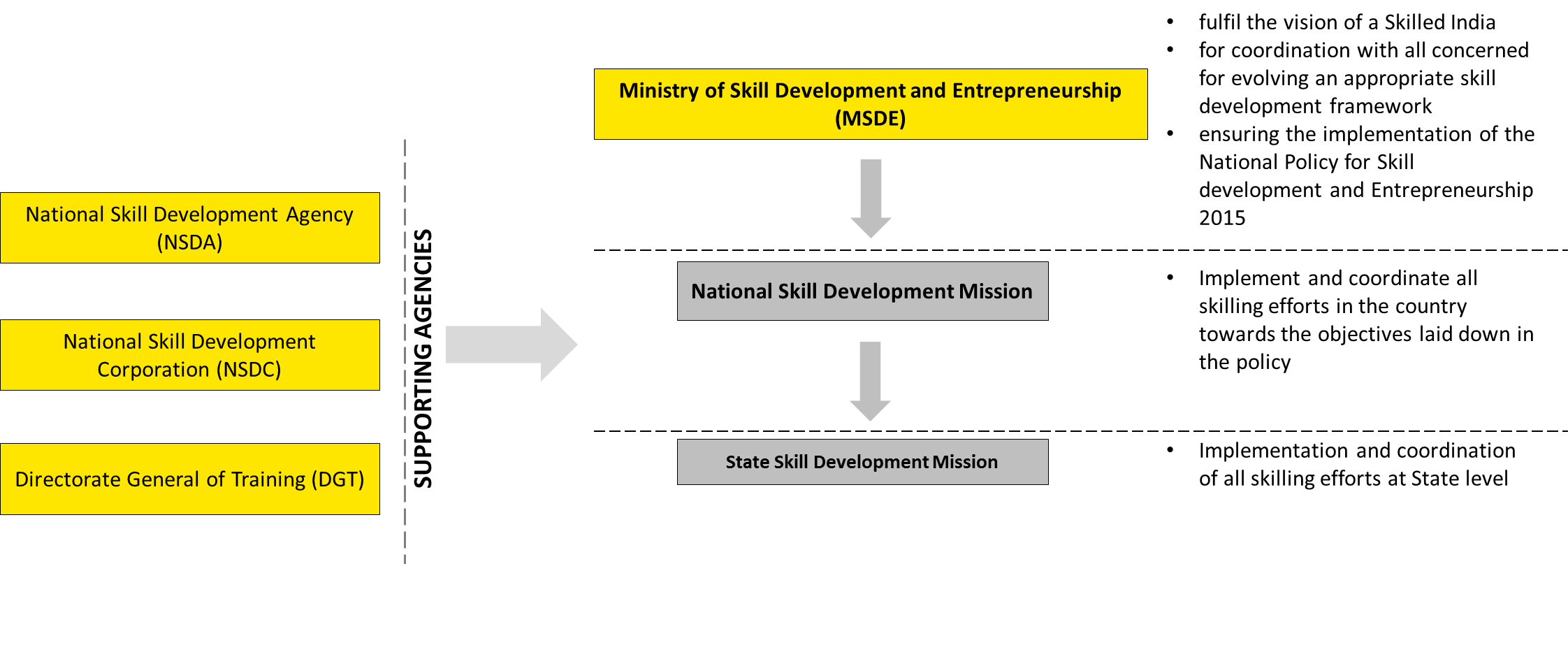
Ministry of Skill Development and Entrepreneurship (MSDE)
MSDE had been created to fulfil the vision of a Skilled India’ where human resource development is the primary focus. MSDE is responsible for coordination with all concerned for evolving an appropriate skill development framework, removal of disconnect between demand for, and supply of, skilled manpower, skill up-gradation, building of new skills, innovative thinking and talents for existing and future jobs.
Website: http://www.msde.gov.in
National Skill Development Mission
The National Skill Development Mission was approved by the Union Cabinet on 01.07.2015, and officially launched by the Hon’ble Prime Minister on 15.07.2015 on the occasion of World Youth Skills Day. The Mission has been developed to create convergence across sectors and States in terms of skill training activities. Further, to achieve the vision of ‘Skilled India’, the National Skill Development Mission would not only consolidate and coordinate skilling efforts, but also expedite decision making across sectors to achieve skilling at scale with speed and standards. It is implemented through a streamlined institutional mechanism driven by Ministry of Skill Development and Entrepreneurship (MSDE). Key institutional mechanisms for achieving the objectives of the Mission have been divided into three tiers, which consist of a Governing Council for policy guidance at apex level, a Steering Committee and a Mission Directorate (along with an Executive Committee) as the executive arm of the Mission. Mission Directorate is supported by three other institutions: National Skill Development Agency (NSDA), National Skill Development Corporation (NSDC), and Directorate General of Training (DGT) – all of which have horizontal linkages with Mission Directorate to facilitate smooth functioning of the national institutional mechanism.
Website: http://nsdmedu.org.in
National Skill Development Agency (NSDA)
NSDA was set up as a Society in June 2013. NSDA focuses on the two verticals of Quality Assurance and policy research in the skills space. It is majorly responsible for the following activities:
- Operationalise and implement National Skills Qualification Framework (NSQF).
- Establish and operationalise a QA framework embedded in NSQF to improve consistency of outcomes in the skills landscape, which will include laying down a framework for training, assessment and certification processes and agencies in the country.
- Operationalise National Skills Qualification Committee (NSQC) to meet its objectives.
- Design and implement the National Labour Market Information System.
- Develop national protocols for registration and accreditation of private training providers.
- Promote use of ‘Skill India’ logo on skill certificates by SSCs/Agencies adhering to the QA framework.
Website: http://www.nsda.gov.in
National Skill Development Corporation (NSDC)
NSDC, a Public Private Partnership was set up in 2008 as a Section 25 company under Companies Act 1956 with shareholding of GOI 49% and private sector 51%. It will be the nodal organization for all private sector initiatives in the short term skilling space. Its mandate primarily includes -
- Catalysing the creation of market-based, scalable business by providing funding through a combination of debt, equity and grants.
- Implementing skills voucher programme.
- Driving engagement with industry and businesses.
- Promoting centres of excellence for training of trainers in coordination with States and SSCs.
- Initiating and incubating Sector Skills Councils (SSCs).
- Discharging any other function as may be assigned to it by the Ministry.
Website: http://www.nsdcindia.org
Directorate General of Training
The two verticals of Training and Apprenticeship Training under DGET, Ministry of Labour & Employment have been shifted to MSDE from 16th April 2015. Its large institutional framework consisting of ITIs, ATIs, RVTIs and other national institutes will act as tools of execution for Mission activities. Other functions include:
- Setting up framework for structure of courses, assessment, curricula creation, affiliation and accreditation of institutes, under NCVT.
- Developing national standards on syllabi, equipment, scale of space, duration of courses and methods of training.
- Advising on training policy in its network of training institute.
- Coordinate functioning of Industrial Training Institutes (ITIs).
- Running training programmes for training of trainers/instructors.
- Running special institutes for training of women.
- Leveraging field infrastructure for strong industry interface in all facets of training, including on-the-job training.
- Providing technical support to vocational education across the country.
- Anchoring and operationalizing Apprentices Act, 1961 as overhauled by comprehensive amendments in Dec, 2014.
- Operationalizing various training schemes through ITIs and Vocational Training Providers (VTPs).
Website: http://www.dget.nic.in/content




